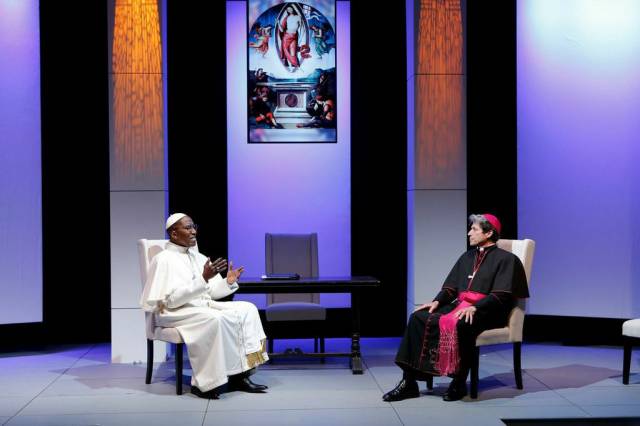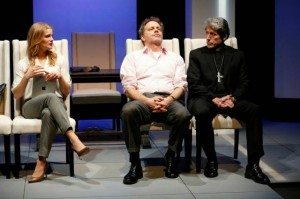

The Road to Damascus, Tom Dulack's new play at 59E59 Theaters, is explosive. Quite literally; the play opens on a scene of crisis. Suicide bombers have attacked Miami and New York City near Rockefeller Center and St. Patrick's Cathedral (an unsettling locale considering its close proximity to the theater), and the United States government, placing the blame on Syrian backed Islamic extremists, plans to retaliate by bombing Damascus, which could potentially set off a wide scale international conflict.
Enter Dulack's anti-hero, middle aged, scotch swilling, many time divorcee and career diplomat Dexter Hobhouse played with a disaffected, guarded charm by Rufus Collins. Hobhouse happens to have been old school pals with a top member of the Pope's council, so he is tasked by the State Department to go to the Vatican to stall the Pope, who intends to go to Damascus with the hope that his physical presence there will prevent the impending U.S. military strike and save the lives of countless men, women, and children. With Hobhouse's help, the U.S. will launch their strike while the Pope sits in deliberation.
What unfolds is an incisive and often frightening look into the greed and double-dealing of our international affairs, and the casual way in which the lives of innocent people can be cast aside in the pursuit of power and politics. Liza Vann shines as Bree Benson, a ferocious and foul mouthed NSA agent "brought in by Hillary," a perfect exemplar of how politics becomes a game, and the players comfortably distanced from the tragedies and atrocities of their moves. Mel Johnson Jr., as Augustine, the first black Pope, is a calm and righteous force, a hallmark of hope and idealism as well as a reminder of the inextricable link between religion and politics. To heighten the feeling of a clock-ticking political thriller, The Road to Damascus takes place on a slick, sterile set that strikes a balance between modern and minimal, the perfect stage for the back room machinations and clandestine meetings the play delivers.

Dulack marries of the small problems of intimacy with the widescale problems of religious and political turmoil, as the play explores the relationship between Hobhouse and Chechneyan Muslim Nadia Kirilenko, world renowned news anchor for Panarabya, an Arabic news channel. Running concurrent to the chaos that swirls around them, Nadia and Dexter's concerns of trust, power, and commitment adds a human relatability that manages to raise both the stakes and the believability of an unfamiliar, chaotic world.
The Road to Damascus has a fearlessness and unapologetic boldness that feels fresh and necessary, and though he ultimately leaves us on a note of uncertainty, Dulack enacts a prescient vision of the future, daring to imagine what might happen if even a handful of people were to stand up against massive, seemingly unappeasable forces of power, greed, fear, and corruption.